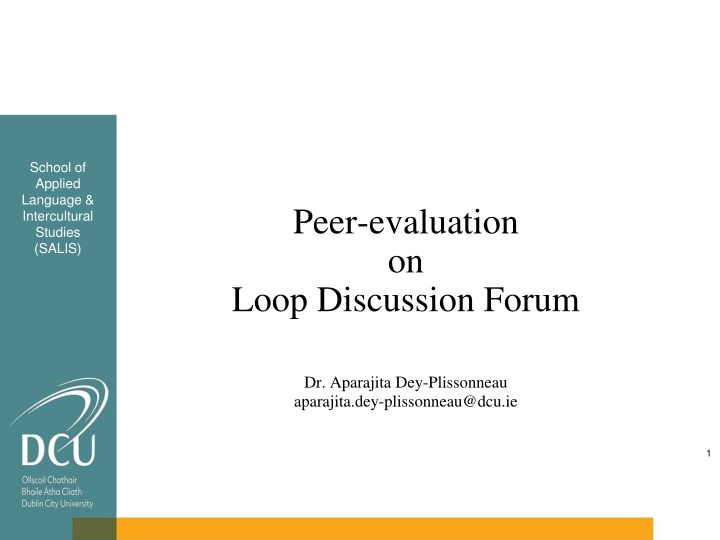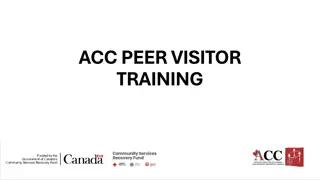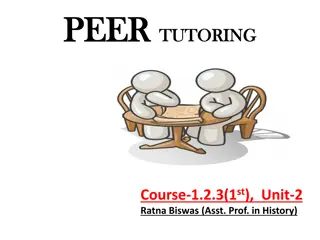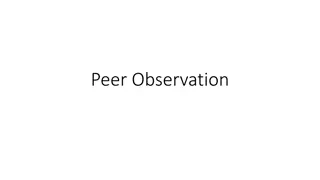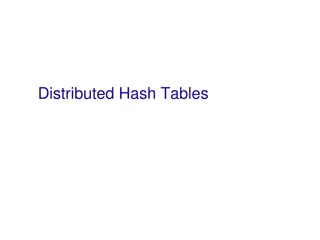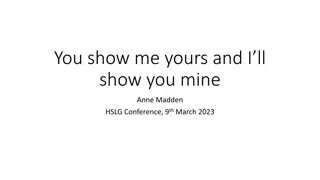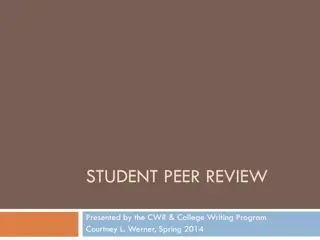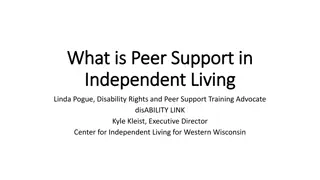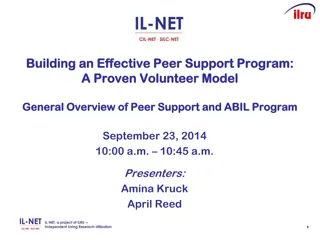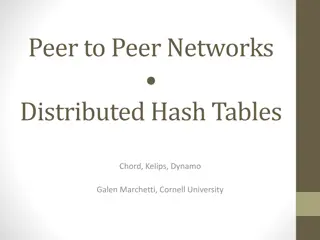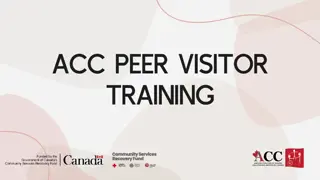Peer Evaluation Strategies in SALIS Language Module
Explore the peer evaluation methods used in the School of Applied Language & Intercultural Studies (SALIS) for the FR376 French module. The approach includes criteria such as linguistic quality, interaction management, and drawing lessons for future productions. Rubrics on Loop Forum aid in assessing student work, with pros like clear guidelines and learner involvement alongside cons like lack of anonymity.
Download Presentation

Please find below an Image/Link to download the presentation.
The content on the website is provided AS IS for your information and personal use only. It may not be sold, licensed, or shared on other websites without obtaining consent from the author.If you encounter any issues during the download, it is possible that the publisher has removed the file from their server.
You are allowed to download the files provided on this website for personal or commercial use, subject to the condition that they are used lawfully. All files are the property of their respective owners.
The content on the website is provided AS IS for your information and personal use only. It may not be sold, licensed, or shared on other websites without obtaining consent from the author.
E N D
Presentation Transcript
School of Applied Language & Intercultural Studies (SALIS) Peer-evaluation on Loop Discussion Forum Dr. Aparajita Dey-Plissonneau aparajita.dey-plissonneau@dcu.ie 1
Context & Design for learning School of Applied Language & Intercultural Studies (SALIS) Module: FR376_2020/2021, French (Higher Intermediate) Objectives: Methodological, Linguistic, Meta-level learning Synchronous activity Criteria & Methodology to help students with peer- evaluation Lecturer feedback based on rubric via Fourm Peer-evaluation via Loop Forum Asynchronous activity 2
Criteria for peer-evaluation School of Applied Language & Intercultural Studies (SALIS) Content o Multiple perspectives o Variety of arguments o Relevance of answers given to public Linguistic quality o Grammatical structures o Vocabulary o Pronunciation Interaction management o Time management of the group o Floor occupancy & balanced turn-taking o Spontaneity in interaction o Gestures for more effective communication Lessons to be drawn and applied in one s own future productions Respond to 3 other peer evaluations 3
Using Rubrics on Loop Forum School of Applied Language & Intercultural Studies (SALIS) 4
Pros and Cons of the activity Peer-evaluation -> marked Peer-evaluation -> self-evaluation Clear guidelines Learner voice in assessment and learning activities Technological affordance of recording Lack of anonymity -> an issue School of Applied Language & Intercultural Studies (SALIS) 5
School of Applied Language & Intercultural Studies (SALIS) Thank you ! aparajita.dey-plissonneau@dcu.ie 6
The Problem Taking 2 full weeks per year to grade EF331 (Topics in Applied Economics n e Global Economic Issues ) 100% CA 2017 and 2018 write two essays Pick two from list in 2017 Pick one from list and then common secret essay in 2018 Attendance really low and not much sense of engagement better with secret essay version Referencing issues pretty common Over assessment a common complaint from EPL students
The Proposed Solution Students only write one essay (due before reading week) Rubric given and students told I will be following it strictly The story of the course is tweaked so that the entire course is in service of this essay Students then get someone else's (anonymised) work to assess Students who score less than 45% on essay one write a second essay instead Students own grade adjusted to reflect how accurately they graded their peer For every 3% deviation, student loses 1 mark from their own essay 1 tally Later changed to 4:1
The Actual Solution Made an excellent rubric Made an extraordinary Loop thing
Why Might This Work? Loss Aversion people put a greater weight on losing something than gaining something Rubric gives clear criteria for what a good essay looks like Material really clearly linked to task at hand Three elements will hopefully increase attendance Very high until the lecture after the essay was due Then appallingly low (at times 6/110) foster engagement and critical thinking Survey and focus group evidence
Did it Work? Engagement with Rubric Most agree that they engaged with the rubric Rubric clearly seen to be useful in terms of writing essay 1 ( N= 48, 1= Strongly Agree, 5= Strongly Disagree)
Did it Work? Critical Thinking Takeaway: Most agreed that the assessment helped develop essay writing skills Takeaway: Overwhelming majority agree it helped with critical thinking skills ( N= 48, 1= Strongly Agree, 5= Strongly Disagree)
Supporting Peer Assessment with the Moodle Workshop Activity noel.murphy@dcu.ie
The Moodle Workshop Activity - overview supports broad peer assessment of other student submissions as well as instructor assessment of the original submissions as well as instructor assessment of the peer assessment with random or controlled selection of peer assessors supports anonymous assessment (when appropriately configured*) supports self-assessment, but this can also be excluded Workshop activities have two grades that need to be weighted for the final student result: Grade for submission Grade for assessment Workshop activities have four phases and a closed state: Setup phase Submission phase Assessment phase Grading evaluation phase Closed state docs.moodle.org/39/en/Workshop_activity Introduction, including 10min video
Example Workshop Activity - Phases The Workshop activity has four phases and a closed state: Setup phase Submission phase Assessment phase Grading evaluation phase Closed state
The Moodle Workshop Activity - Setup Phase Turn on editing in your Moodle course page Select Add an activity or resource Select Workshop Select Edit Settings and configure settings as desired, i.e. for grading, submission, assessment, overall feedback to the whole cohort, availability of activity, text matching, activity completion, etc. completed tasks in each phase are indicated with a green tick mark to guide the workshop development and progress In the Setup phase , click Edit assessment form to configure the type of assessment
The Moodle Workshop Activity - Setup Phase Submission Allocation: Manual suitable for small classes and well-known students; drop-down menus for reviewers + reviewees Random suitable for large classes, and arm s length allocation; select number of reviews per submission or per reviewer Scheduled Key Point: To make the peer reviewing anonymous: see docs.moodle.org/311/en/Workshop_FAQ The Workshop activity is robust and fairly (Moodle) intuitive - commit to using it and learn as you go
